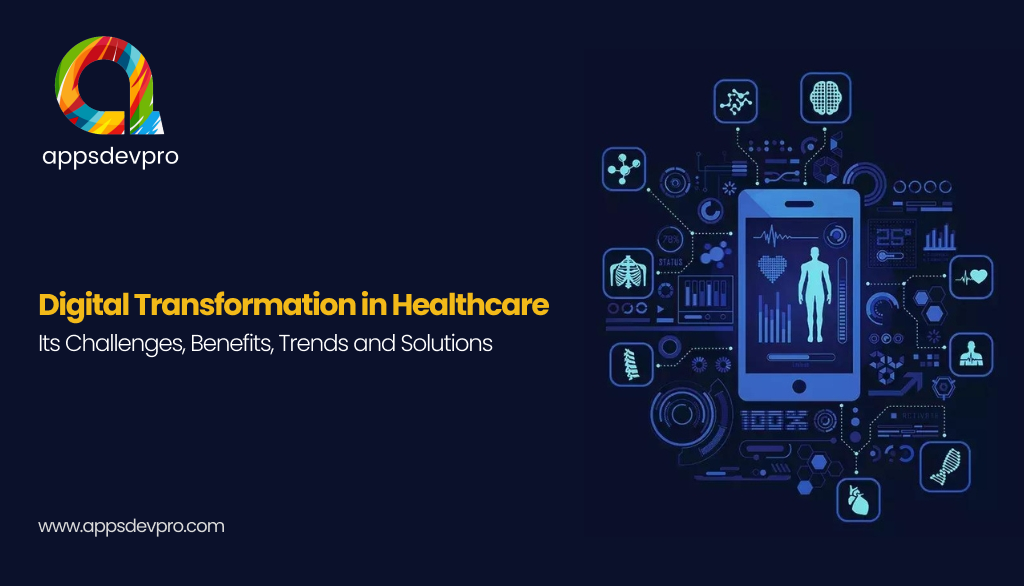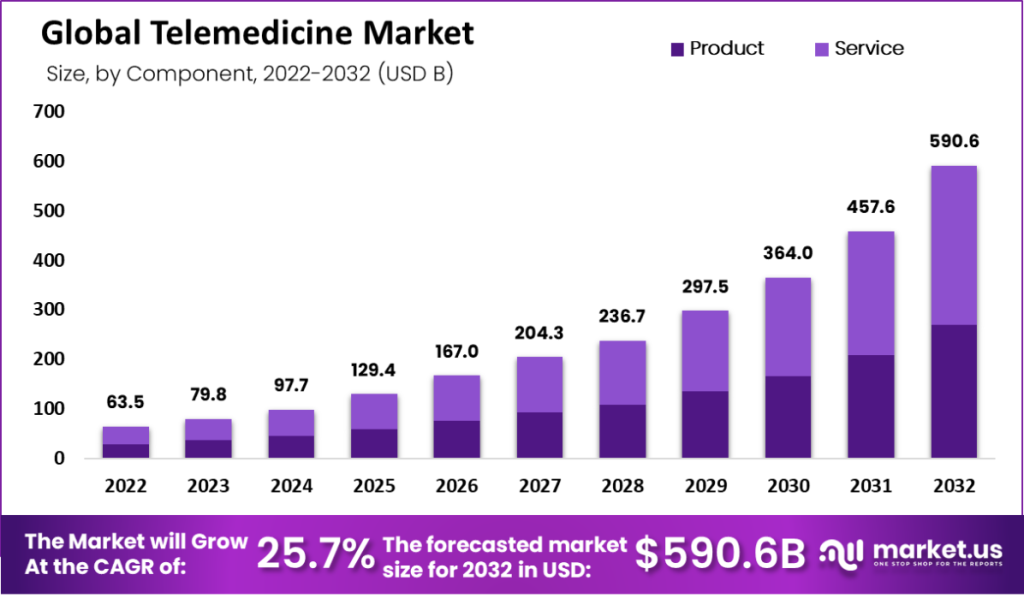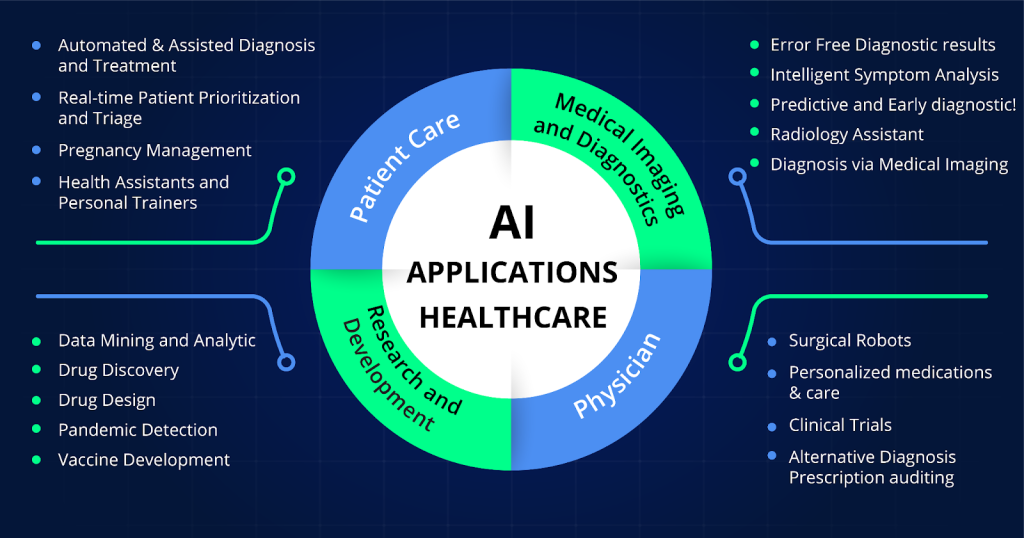
Blog Summary: Digital transformation in healthcare is rapidly revolutionizing operations by automating repetitive tasks and providing cost-effective solutions. The major key drivers of healthcare digitalization are AI, ML, IoT, Blockchain, Big Data, and Cloud Storage enabling streamlined workflows, automating appointment scheduling, record keeping, etc. But are they easy to implement? Here’s a complete blog to learn everything about the digital transformation in Healthcare.
Start your dream project?
We have a TEAM to get you there.If you are in the healthcare business, you must have an idea of how digital transformation in healthcare is taking the lead and offering advanced ways of process optimization, automating repetitive tasks, and ensuring impactful treatments.
With various emerging technologies entering the world, undoubtedly digital transformation is strongly making an impression among all industries.
According to Gartner, 91% of businesses are already engaged in some form of digital initiative whereas 87% of senior business leaders have recognized that digitalization is a priority. With that fact, it is reported that by 2026, global spending on digital transformation will hit $3.4 trillion.
89% of all companies have already adopted a digital-first business strategy but the “Healthcare Sector” has leveraged more from digitalization. However the healthcare sector still has room for improvement.
In reality, all small- medium health businesses are hinges on the edge of deciding whether to stay back with the traditional healthcare process or adopt new digital healthcare trends to become a part of this thriving picture!
Ready for the journey of digital transformation in the Healthcare sector? Introducing AppsDevPro as your tech partner, skilled in implementing the best healthcare transformation strategies!
As healthcare is at the forefront of gaining the maximum advantage of this digital transformation, reimagining your business process with all the digital capabilities is an urgent need of the hour.
What is Digital Transformation in Healthcare?
Digital Transformation in healthcare is making use of the latest technologies, strategies, methodologies, and processes to actively augment value for both patients and healthcare organizations, maximizing benefits for all involved.
The foundational journey of digital healthcare is geared up by offering optimizing benefits. From structuring applications of technology into the healthcare process to addressing challenges aligned with the traditional approach, healthcare digitalization covers everything.
The prime instance to be discussed here is “Connected Inhalers”, which track patients’ usage and remind them when to take dosage to maintain a healthy schedule. Implementation of such smart monitoring technology in connected inhalers resulted in the prevention of 66% of Asthma deaths.
Other healthcare organizations can help patients with digital health solutions to deliver instant care and encourage patients to self-management. In best-case scenarios, digitalization in healthcare can easily make its way to a cultural shift from traditional to collaborative care.
What Are the Benefits of Digital Transformation in Healthcare?
Digital transformation in healthcare offers an array of benefits to patients, healthcare organizations, and payers. So when hiring a mobile app developer in India to customize healthcare solutions, make sure you decide the functionalities by three panels: healthcare organizations, patients, and Payers.
Let’s quickly jump on the benefits each stakeholder will leverage with Digitalization in Healthcare…
Healthcare Digital Transformation for Patients:
- Patients can access medical records and appointments digitally, ensuring patients receive timely attention.
- With electronic records, patients benefit from more precise diagnoses and tailored treatments. Maintaining health records digitally can minimize the risk of errors and data loss.
- The digital platforms are fully encrypted therefore secure messaging platforms to patients ask any query anytime. Overall this fosters clear and efficient communication.
Healthcare Digital Transformation Benefits for Providers:
- With automation implementation in the healthcare process, organizations can reduce manual workload, allowing care providers to focus more on patient care and less on paperwork.
- Digital systems help providers adhere to regulations, avoid mishaps, and ensure ethical standards.
- By eliminating paper records and enhancing communication, digital transformation drives down operational costs while improving the quality of care.
Healthcare Digital Transformation Benefits for Payers:
- Increasing data security as advanced digital tools enables payers to detect and prevent fraudulent claims more effectively, safeguarding financial integrity.
- Digitalization streamlines processes, improving claims processing speed and accuracy while reducing administrative overhead.
- Payers can diversify their offerings with innovative products like telemedicine and personalized care plans, meeting evolving consumer needs.
In a nutshell, the prime benefits of digital transformation in healthcare are to optimize healthcare delivery and streamline process, access, accuracy, and efficiency across the board.
By embracing digital technologies, stakeholders can navigate the evolving healthcare landscape with greater agility, ultimately enhancing patient outcomes and industry sustainability. And the simple way of bringing this change into your healthcare is to hire dedicated developers in India with the right skills and experience.
But the central question is what tech trends are driving digital healthcare?
What Are the Key Drivers of Healthcare Digitization?
The digital transformation in healthcare has completely reshaped how patients interact with healthcare professionals. Using advanced technologies like AI, ML, Big Data, and more, healthcare providers have started storing data on clouds, able to share it anytime, anywhere that fosters the treatment plan and allows them to make instant decisions.
That’s not all, various emerging technologies are empowering the healthcare industry and allowing them to optimize systems, lowering costs, reducing human errors, and enhancing outcomes.
Just keep in mind that innovation is the game name here. The more innovative digital strategies you implement, the more chances you have of becoming at the forefront.
1. Telemedicine
After COVID-19, patients find telemedicine as one of the most convenient ways of seeking care, therefore it has experienced widespread adoption after 2020. It has completely revolutionized healthcare delivery by transcending geographical barriers and enhancing accessibility to medicine 2024/7.

Healthcare organizations have quickly recognized the increasing boom of this trend, and allow patients to seamlessly access remote consultations, monitoring, and diagnosis using digital platforms
With this digital transformation in healthcare, patients have started receiving on-time care right from the comfort of their homes. This transformative approach not only improves patient convenience but also facilitates early intervention and preventive measures, leading to better health outcomes.
2. Using AI and ML For Automation
How many of you think that implementing advanced algorithms of AI and ML seems to be a paradigm shift in the healthcare sector? Using the richness of AI ML providers have started offering unmatched potential to revolutionize patient care.
But how?

Source: techment
To reap the best benefits of AI and ML technology in healthcare, simply implement them into your healthcare system. Now AI-integrated healthcare solutions can easily analyze vast database inputs at excellent speed and accuracy and can detect subtle patterns of any disease. The biggest perk of using it is it helps in early disease diagnosis and treatment planning.
Additionally, AI streamlines workflows, reducing operational burdens and allowing healthcare professionals to focus more on patient care by automating repetitive tasks. So if it comes to concluding the role of AI and ML in healthcare digital transformation, then you need to know:
- AI boosts diagnostic accuracy and treatment planning in healthcare.
- Predictive analytics enable proactive patient interventions.
- Automation streamlines administrative tasks, enhancing efficiency.
- AI detects diseases early, improving treatment outcomes.
- Personalized care plans optimize treatment effectiveness.
- AI-driven systems help optimize healthcare costs.
- Continuous learning improves AI systems over time.
- Overall, AI enhances patient care quality and efficiency in healthcare delivery.
3. The Internet of Mobile Things (IoMT)
Have you noticed why every second person has started wearing a smartwatch? Many of you will answer that of course for remote monitoring!
However, practically wearable devices and remote monitoring tools are taking the healthcare industry to the next level by allowing patients to easily gather real-time data and enabling healthcare providers to personalize patient care.
By keeping track of all health issues related to vital signs, medication schedules, and early warning signals, IoMT devices enable quick interventions and tailored treatments.
This proactive approach not only enhances patient outcomes but also streamlines healthcare operations, reducing hospital visits and costs.
4. Blockchain For Enhanced Security
Data security is always the prime concern of healthcare providers. Any data loss can lead to a major healthcare blunder. This is where Healthcare providers started using Blockchain technology to leverage robust security features. Now you don’t have to maintain data records on Excel.
Blockchain technology helps providers store, manage, and access data on a centralized platform. This allows for easy access to vital information anytime, anywhere. Moreover, patients can exchange data with providers without any risk. Blockchain safeguards patient records from unauthorized access and tampering.
This technology enhances patient record management by providing a transparent and immutable ledger, reducing errors and ensuring data integrity. Blockchain technology enables fraud detection by creating a traceable audit trail, bolstering accountability throughout the healthcare ecosystem.
Its focus on data integrity and privacy offers a promising solution for addressing all cybersecurity-related concerns, and instilling trust in healthcare systems. With blockchain, data exchange becomes secure, patient records remain tamper-proof, and fraudulent activities are easily identified, ensuring the reliability and confidentiality of sensitive healthcare information.
5. Cloud Adoption To Enhance Collaborative Capabilities
Healthcare organizations are working with an expansive amount of data. As they grow, they need a solution that can easily accommodate the increasing data and able to scale up. That’s where healthcare providers are increasingly turning to cloud computing solutions for their scalability, data sharing, and collaborative capabilities.
Cloud adoption enables these organizations to store vast amounts of data securely while facilitating seamless sharing among healthcare providers and departments.
The 24/7 accessibility of data on cloud storage enhances interoperability, allowing different systems and platforms to communicate effectively at any time. Instant access to data allows healthcare professionals to make the right decision and leads to improved efficiency and better patient care.
There is no doubt in this fact that these top trends are driving digital transformation in healthcare, but are they easy to implement?
Let’s check it out!
Healthcare Digital Transformation: Barriers and Challenges in Adoption
Digital transformation in healthcare brings a wide range of benefits but how far its easier to implement in complex healthcare organizations? The bright side of healthcare digital transformation is encouraging providers to quickly embrace the change but there are few challenges and barriers that you may have to come across.
Let’s shed some light on the same:
1. Data Security and Privacy
Keeping your patient’s healthcare data secure and private within your system is not only the provider’s prime responsibility but also a cybersecurity concern that they have to take seriously. But how far they are practically successful in keeping all the sensitive data secure?
As per reports, in 2021 there were 45.9 million records breached and in 2022 it surged to 51.9 million records but 2023 turned out to be worse with the exposure of 133 million records.

Source: hipaajournal
With the increasing healthcare digitalization, more data is being exchanged online. This brings security concerns.
The solution to this barrier:
While various administrative enterprise resource planning (ERP) software options are available in the market that allows you to manage, store, and access data digitally, not all meet the stringent security requirements of the healthcare sector.
Selecting the appropriate digital healthcare solutions is crucial for compliance with regulations and safeguarding patient data. So accordingly look for solutions that prioritize to adhere all industry regulations and employ robust security measures to protect patient confidentiality.
By choosing the right digital healthcare solutions, healthcare providers can mitigate the risks associated with data breaches and ensure patient trust and safety.
2. Expensive Price Tags
Another major reason that most startup mid-level organizations, hospitals, or companies put their digital transformation plans on hold is the cost factor. Usually, the companies primarily focus on the ROI while ignoring the value proposition of adopting digital transformation can deliver in coming years.
Implementing any type of healthcare solution requires expensive costs and the need to hire software developers in India for customization.
But businesses forget the fact that digital transformation can enable higher scalability, streamline workflows, and lower operational costs, ensuring more profits in comparison to the traditional approach.
The solution to this barrier:
To save on cost you can adopt the agile software development methodology that drastically fosters the speed of the digital transformation process. Its incremental and interactive model can also accommodate new changes in the solution in extremely cost-efficient ways.
3. Shortage of Staff
Staff shortages in healthcare present a challenge as digital healthcare evolves. Traditionally, IT and healthcare operated separately, but now healthcare professionals need to embrace digital solutions. However, many are slow to adapt.
The solution to this barrier:
To address this, healthcare organizations must prioritize training programs to equip their staff with digital skills. By doing so, they can overcome staff shortages and ensure quality patient care in the digital age.
So these are the few major challenges that the healthcare sector is factions and holding themselves back from adopting digital transformation.
Introducing AppsDevPro As a Solution Partner to Healthcare Transformation
If you are reading to transform your healthcare journey with digitization, then AppsDevPro can be a trusted platform. Instead of just adopting the standard approach of digitization in healthcare, their experts will evaluate your requirements and appoint a team of developers who closely work with you.
Being specialized in digital transformation for various industries, including healthcare, we understand your requirements and can implement unmatched skills and expertise to deliver cutting-edge solutions that are tailored to your specific needs.
Whether you are planning to develop a healthcare app from scratch or just need to upgrade it with the latest tech trends like telemedicine, keep in mind that AppsDevPro will stand by your side.
Our core certifications and project rack records further reflect our commitment to quality, ensuring adherence to international standards. All our healthcare software solutions are HIPAA compliant, prioritizing security and compliance for data protection.
Collaboration with AppsDevPro is quick and simple. You can hire a team of developers with us by choosing from flexible engagement models and able to get started with the project. Our experts will guide you through each step of app development.
Conclusion
With this blog guide, you have a fair idea of how digital transformation in healthcare is evolving to the next level. Digitalization has introduced several improved plans that lead to better patient care and lower costs and work burdens.
The aim of digitalization is not to just enhance care but also to allow professionals and organizations to reduce efforts and save time in managing all healthcare processes. So if you are looking to get started then we recommend hiring a mobile app developer in India who can customize the transformative strategy for your organization. If you still have doubts or related queries then contact us!
FAQs
To explore more about digital transformation in healthcare, you explore this FAQs section to get all the answers to your questions related to healthcare digitalization.
How do I know if my organization needs digital transformation?
The major signs to recognize the need for digital transformation include:
– Using the same outdated technology,
– Inefficient processes lacking scaling and flexibility,
– Challenging to revolutionize as per changing customer needs,
– If falling behind competitors who are leveraging digital tools effectively.
Where do I start with digital transformation?
To get started with digital transformation in healthcare, you need to first evaluate your business requirements and goals and understand what you are trying to achieve through this digital transformation. Decide what needs you want to accommodate with digitalization and accordingly plan a strategy.
You can also check our other services:
Hire Xamarin App Developer in India, Hire iPhone App Developers in India, Hire Android App Developers in India, Hire Flutter App Developer in India, Hire React Native Developers in India, Hire Kotlin Developer in India, Hire Web Developer in India, Hire PHP Developer in India, Hire Laravel Developer in India, Hire Nodejs Developer in India, Hire Microsoft Developer in India, Hire ASP.NET Developer in India, Hire Angular.js Developer in India, Hire React.js Developer in India, Hire E-commerce Developer in India, Hire Magento Developer in India, Hire WordPress Developer, Hire AI Developers in India, Hire Java Developers in India, Hire Python Developers in India, Hire Javascript Developer in India, Hire AR/VR Developers in India, Hire Blockchain Developers in India
